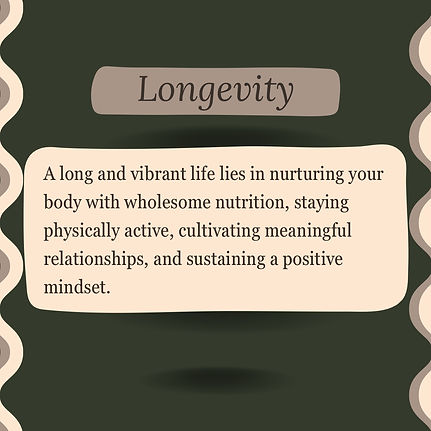
What influences a superior outcome?
Longevity is the catchphrase for the upcoming year. It’s a hot topic as compelling progress is made daily in medical research. Science is continuously pursuing topics on age-related disease, aging gracefully, and appreciating optimal health and well-being, but what lifestyle practices are associated with quality life expectancy? And how does one embrace that payoff greatly influenced by genetics, the environment, and lifestyle?
How does genetics impact the aging process?
In various studies, our DNA, inherited from generations before us, is said to determine between 20-40% of life expectancy. Our biological makeup’s role in declining healthy tissues and organs is studied in detail, but lifestyle choices can often override genetic predispositions.
Supporting and advocating for your best health is the journey, so let’s unlock some key factors.
The Environment: Prolonged exposure to pollutants and toxins can interfere with healthy cells and affect some individuals more than others. For example, mold in and around our homes is typical and challenging to control entirely. Check familiar places around your home and take measures to prevent and remove harmful strains if you suspect or can visually see growth on paper products, cardboard, ceiling tiles, or wood products. The repercussions and health issues associated with toxic mold are asthma, rashes, upper respiratory infections, chronic sinus infections, and sore throats.
Stress Management: Practicing mindfulness and relaxation techniques that alleviate the burden of stress helps avoid gene expression associated with chronic stress. With prolonged stress responses, the body becomes weak and susceptible to illness.
Nutrition: Dietary patterns affect genes connected to the development of metabolic health, inflammation, and disease risk. Limiting overly processed foods, added sugars, and saturated fats is a step toward better health. In addition, highlighting a diet rich in antioxidants from whole intact foods like fruits, vegetables, whole grains, and lean proteins contributes to less oxidative stress and overall cellular improvements.
Restorative Sleep: Quality sleep is 7-9 hours of uninterrupted rest. The benefits of gene regulation are that it improves metabolism, immune health, and cognitive functions.
Daily Movement: Regular exercise is associated with less inflammation, muscle growth, metabolism, and cardiovascular health. Movement is fundamental to good health and a body that will reward you for your efforts later in life. Furthermore, it’s not just the physical attributes. Regular exercise aids proper digestion, improves brain health, and strengthens immunity. Use the stairs, walk more, and use weights and your body’s resistance to reduce the risk of disease, reinforce bone and muscle structure, and improve your ability to conquer everyday activities.
Social Interactions: Connecting to the community and supportive social networks influence mental health, stress responses, and balance. Strong relationships are linked to enhanced health and robust aging.
Advocate for your health by getting in tune with longevity and its perks. One can alter an unfavorable outcome with a heightened awareness, purpose, and meaning.
Activating or suppressing specific genes may lead to diverse health outcomes. However, it is essential to note that as we are all unique in our physiologies, responses may vary in genetics and circumstances, such as access to healthcare and other factors discussed above. Engaging in positive lifestyle practices sets the stage for healthful payback for the time and effort invested.
While there is no guarantee, awareness, and enlightenment on the subject put one in a position to choose and change if need be. The outcome of death is inevitable, but instead of fearing the unavoidable, wouldn’t it make more sense to support and forecast sunnier days, vitality, and robust golden years? It’s never too late to start!
In good health!

